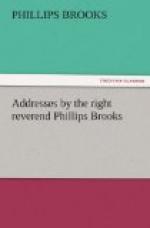He had said, “A house divided against itself
cannot stand. I believe this Government cannot
endure permanently, half slave and half free.
I do not expect the Union to be dissolved; I do not
expect the house to fall; but I expect it will cease
to be divided. It will become all one thing or
all the other.” When the question came,
he knew which thing he meant that it should be.
His whole nature settled that question for him.
Such a man must always live as he used to say he lived
(and was blamed for saying it) “controlled by
events, not controlling them.” And with
a reverent and clear mind, to be controlled by events
means to be controlled by God. For such a man
there was no hesitation when God brought him up face
to face with Slavery and put the sword into his hand
and said, “Strike it down dead.” He
was a willing servant then. If ever the face
of a man writing solemn words glowed with a solemn
joy, it must have been the face of Abraham Lincoln,
as he bent over the page where the Emancipation Proclamation
of 1863 was growing into shape, and giving manhood
and freedom as he wrote it to hundreds of thousands
of his fellow-men. Here was a work in which his
whole nature could rejoice. Here was an act that
crowned the whole culture of his life. All the
past, the free boyhood in the woods, the free youth
upon the farm, the free manhood in the honorable citizen’s
employments—all his freedom gathered and
completed itself in this. And as the swarthy
multitudes came in, ragged, and tired, and hungry,
and ignorant, but free forever from anything but the
memorial scars of the fetters and the whip, singing
rude songs in which the new triumph of freedom struggled
and heaved below the sad melody that had been shaped
for bondage; as in their camps and hovels there grew
up to their half-superstitious eyes the image of a
great Father almost more than man, to whom they owed
their freedom,—were they not half right?
For it was not to one man, driven by stress of policy,
or swept off by a whim of pity, that the noble act
was due. It was to the American nature, long kept
by God in his own intentions till his time should
come, at last emerging into sight and power, and bound
up and embodied in this best and most American of
all Americans, to whom we and those poor frightened
slaves at last might look up together and love to
call him, with one voice, our Father.
Thus, we have seen something of what the character of Mr. Lincoln was, and how it issued in the life he lived. It remains for us to see how it resulted also in the terrible death which has laid his murdered body here in our town among lamenting multitudes to-day. It is not a hard question, though it is sad to answer. We saw the two natures, the nature of Slavery and the nature of Freedom, at last set against each other, come at last to open war. Both fought, fought long, fought bravely; but each, as was perfectly natural, fought with the tools and in the ways which its own character had made familiar to it. The character




